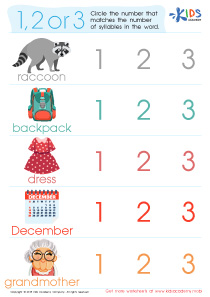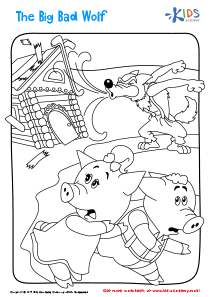3 results
3 filtered results
Clear all filters3 filtered results
-
From - To
Dive into a world of numbers with our engaging interactive assessment quizzes designed for ages 3-4! Focusing on the fundamentals of "4 and 5," our quizzes offer a fun and immersive learning experience for young minds eager to explore the world of mathematics. Each quiz is crafted to check your child's knowledge on these crucial numbers, providing instant feedback to encourage and guide them towards mastery. With vibrant visuals and interactive challenges, our quizzes make learning about "4 and 5" an adventure. Perfect for preschoolers, these quizzes are tailored to captivate, educate, and inspire children in the 3-4 age range. Start the numerical journey today and watch your little one's love for learning grow!
Interactive quizzes tailored for the foundational years of education are more than just a modern teaching tool; they're a bridge to effective learning, particularly for children in the pivotal age group of 3 to 4 years. Our specially designed quizzes on 4 and 5 are not just numbers on a page; they represent a carefully curated educational journey, aimed at maximizing the learning potential of kids in this critical developmental stage.
At this tender age, children are at a peak of curiosity and absorb information at an impressive rate. It's an opportune time to introduce them to the basics of mathematics, including the concepts of 4 and 5. But why are these quizzes so beneficial for children aged 3-4?
First and foremost, the interactive nature of these quizzes caters to the learning styles of young children who are naturally inclined towards play. By integrating the learning process with elements of fun and engagement, these quizzes ensure that the concepts of 4 and 5 are not just taught but are thoroughly understood and enjoyed. The playful interface piques the interest of young minds, making learning a joyful process rather than a mundane task.
Moreover, our quizzes on 4 and 5 for ages 3-4 are meticulously designed to enhance cognitive development. Engaging with the quizzes stimulates critical thinking and problem-solving skills as children learn to associate numbers with quantities, shapes, and sequences. This early numeracy foundation is crucial, as it lays the groundwork for more complex mathematical operations they will encounter as they progress in their education.
Another key advantage of these interactive quizzes is the immediate feedback mechanism. Unlike traditional classroom settings where feedback can be delayed, our quizzes provide instant responses to the children's answers. This immediate reinforcement helps in cementing the concepts of 4 and 5 in their young minds and encourages a positive learning cycle where their achievements are celebrated instantly, boosting their confidence and motivation to learn.
Emotional and social development is also subtly fostered through these quizzes. Although primarily designed for individual learning, these interactive quizzes can be a shared activity with peers or family, promoting cooperative learning and communication skills. As children discuss and solve the quizzes together, they learn the value of teamwork and develop empathy by helping and encouraging each other.
Furthermore, accessibility is a major benefit of our interactive quizzes. Available online, they provide flexibility for children to learn at their own pace and time, making it convenient for parents and teachers to integrate these quizzes into the child’s daily routine, regardless of the busy schedules that might limit traditional learning settings.
In conclusion, our interactive quizzes on 4 and 5 for ages 3-4 are not just educational tools; they are stepping stones towards a comprehensive learning experience. By focusing on these foundational numbers, we aim to foster not only an early love for mathematics but also to develop critical thinking, social skills, and a lifelong passion for learning. As we embrace these modern teaching methods, we are setting our children on a path of discovery, growth, and academic excellence.











